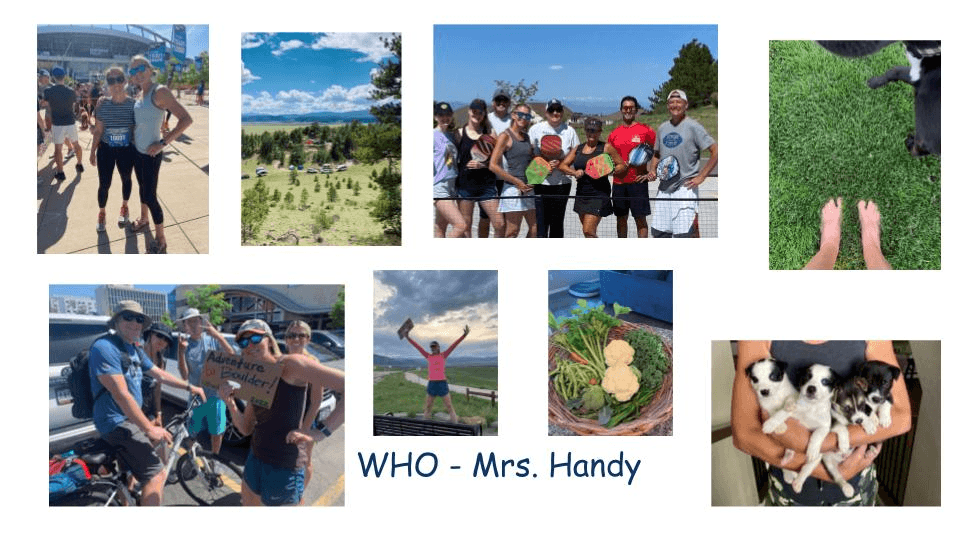Name three ways to practice physical wellness
What are sleep, exercise, sports, healthy habits, nutrition, healthy choices, hygiene, physical activity, etc.?
One example of occupational wellness
What are:
Play, learning, chores, jobs, hobbies, interests, talents, self-care etc.?
Two examples of spiritual wellness
What are:
Beliefs, values, culture, mindfulness, finding peace, joy in daily tasks, etc.?
Name one way to demonstrate emotional wellness
What is/are:
Managing emotions, emotional regulation, positive attitude, growth mindset, mindfulness, gratitude, etc.?
One way to practice social wellness
What is resolving conflicts, communication, tolerance, empathy, relationships, awareness of others?
Explain your heart rate
What is a measure of your heart's beats per minute (BPM) or the speed of the pumping of blood throughout the body?
Name one of Mrs. Handy's hobbies/interests.

Mandalas can be a helpful tool to find peace and joy. Tell us what they are and how to use them
What are drawings that represent feelings, moods, creativity using colors, shapes, and designs?
Name an emotion you might feel if someone takes your phone
What is/are:
Anger, frustration, fear, sadness, etc?
What are conflict resolution strategies? Including mediation, telling your side of the story, hearing the other person's side of the story, brainstorming solutions, trying new ways to overcome
Describe what downtime does for your brain
What is it gives your brain a break to sort out, link, transfer, store information? Doing nothing is something
A guest speaker this semester and their connection to wellness
Who was/were:
Ms. Lisa Smith, Ms. Jessica Bart, Dr. Wilson, Mr. Louis Morphew, Ms. Chris Strater, Mr. Kenny Webb, Ms. Soy Chung, Ms. Anna, Mr. Romero?
Explain a tradition in your family
What is? Give an example
Name three things you are grateful for
What are?
Tell three characteristics of a healthy relationship
What are:
Communication, respect, conflict resolution, kindness, empathy, perspective taking, etc.?
A tabata is a specific type of physical exercise. Explain how it works and what a graph of your HR would look like if you were doing it accurately
What is intervals of 20 sec high intensity and 10 sec of rest repeated 8 times? the graph would look like peaks and valleys
A practice to get your mind and body synched and ready for learning
What is self-regulation?
Describe mindfulness and give one example
What is paying attention to the present moment, on purpose, without judgement?
Seeing, tasting, listening, touching, moving, smelling...
Change this fixed mindset thinking into growth mindset thinking:
"I can't do a push up, I am so weak."
What is:
I can practice and get stronger.
I just don't have it yet.
If I build my muscle strength little by little I can probably get it.
At Central Rec Center describe how you would practice social wellness
What is sharing equipment, leaving the facility clean, putting your gear where it belongs, not using your phone, following rules, saying please/thank you, treating facility with respect, supporting others, kindness to classmates, offering help, holding doors, etc.
Name two neurotransmitters supported by physical activity
What is/are dopamine, serotonin, oxytocin, endorphins?
Name three ways to self-regulate
What are:
Deep breathing, exercise, mindfulness practice, positive self talk, downtime, sleep, squeeze pressure, etc.?
Explain how using the idea of perspective can change the way you think
What is perspective lets you see things from a different space or in a different way? It can help you understand yourself and others points of view.
Name three ways the brain can respond/react to emotions
What are function, flight, fight or freeze?
If you are struggling with your life where can you find resources - name five people or places
What are school, counselors, home, parents, trusting adult, suicide hotline, doctor, church, teacher, sibling, etc.?